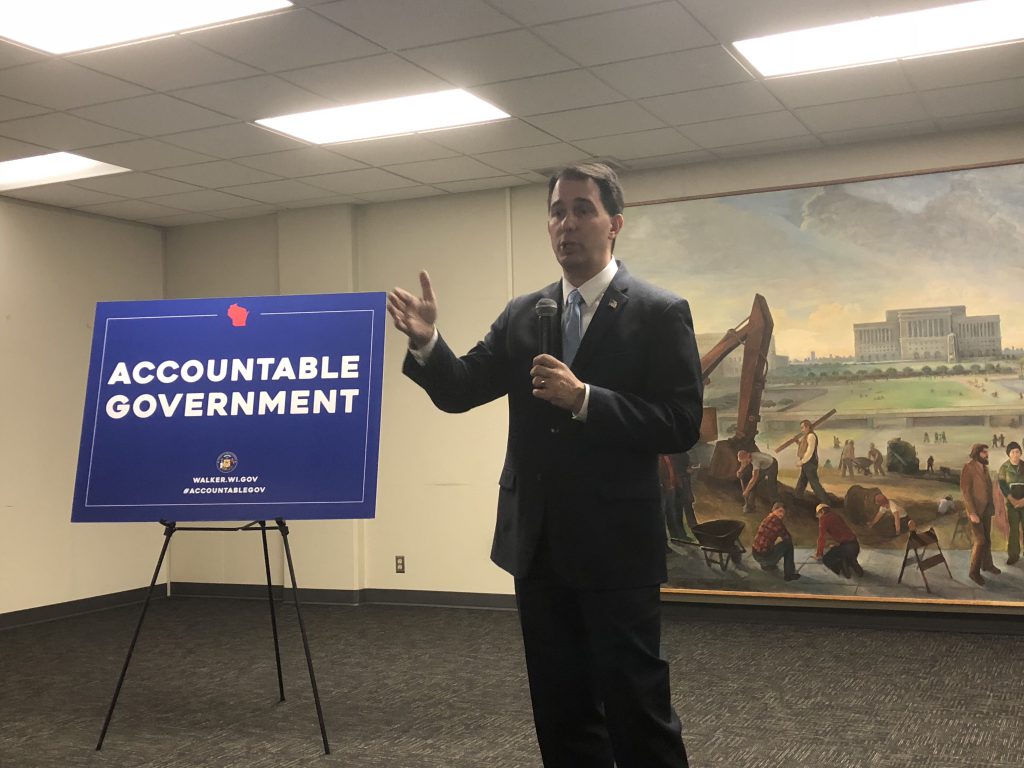Why Walker Lost
He seemed to have the perfect strategy. The top 10 reasons he failed.
Scott Walker is a smart politician and seemed to be making all the right moves
He knew that western Wisconsin would be critical to his reelection effort so he traveled there repeatedly. “Of 424 events outside the Capitol and in his official capacity as governor between January 2017 and March 2018, he scheduled 82 in a swath of western Wisconsin from Grant to Chippewa to St. Croix counties, the Wisconsin State Journal reported. “That’s almost twice as many visits per capita in this area than anywhere else in the state.”
And in his final budget before the election he supported a boost in funding for the schools, ahead of polls showing voters wanted more spending on education. Months before the general campaign began he smartly began calling himself the “Education Governor.”
Meanwhile, Walker had positioned himself to absolutely bury whichever Democrat opposed him, to drive his opponent’s negatives as high as possible. Walker had a huge cash advantage, $50 million in campaign and outside group spending, compared to just $14 million for challenger Tony Evers.
Yet Walker lost. How could such a skilled, well-funded politician get defeated? Many reasons, but here are the most critical, in order of importance:
1. His run for president: It wasn’t just that Walker’s national run was a disastrous failure that often made him look foolish. He also looked like he wasn’t devoting full attention to the job of governor. Polls showed his approval rating in Wisconsin dropped to his lowest point, to 37 percent. Walker gradually brought that number back into the high 40s, but his presidential run stained him indelibly as an ambitious pol, and Evers milked that issue, arguing that decisions like Walker’s rejection of $1 billion in federal Medicaid funding was to help his run for office while cheating Wisconsin taxpayers.
2. Walker Fatigue: It’s tough to win a third term. Only Republican Tommy Thompson did it, and he practiced the politics of addition, constantly selling himself to voters in both parties. Walker perfected the politics of subtraction, what he called a “divide and conquer” strategy, and independent voters grew weary of it, which is why he lost swing areas like western Wisconsin and Kenosha County. But the lower percentage of votes in Republican strongholds like Waukesha County suggests Walker also lost some GOP voters. Walker didn’t help with frequent references to how much better he was than Democrat Jim Doyle, who hasn’t been on the ballot since 2006. Elections are about the future and Walker looked stale with all those references to the past.
4. The Worst Possible Opponent: Yes, Tony Evers is bland, but that very blandness helped neutralize the negative ads against him. And Evers’ ads contrasting the “teacher” against the “politician” quickly obliterated Walker’s claim to be an education governor. In their debates Walker seemed canned, a smooth-talking politician mouthing the same sound bites, while Evers seemed fresher, more caring and far more genuine.
5.Walker’s Lies Caught Up With Him: This is a guy who couldn’t even tell the truth about his male-pattern baldness, claiming it was due to hitting his head on a kitchen cabinet. In the 2014 election he promised unions he wouldn’t support a right to work law and then quickly signed the law after his reelection. He told voters he had no plans to run for president and began working the campaign almost as soon as he was reelected. He lied about trying to eliminate the “Wisconsin Idea” from state law, and told whoppers about why he wouldn’t allow special elections, which the courts didn’t buy. At some point the lies began to mount up even among voters who aren’t paying much attention.
6. Walker’s Flip Flop on Pre-Existing Conditions: This was probably the most important issue of the election across the nation and here was Walker supporting a lawsuit to kill the Affordable Care Act and its coverage of pre-existing conditions. Walker’s ads promising he would protect pre-existing conditions were at best a contradiction, and at worst a reminder that he was a practiced liar once again trying to fool the voters.
7. The Negative Ads Didn’t Work: A key to Walker’s campaign was a blitzkrieg of ads attacking Evers. They had some impact, to judge by polls showing Evers’ negatives went up. But there was a certain sameness to so many of them — the basso voice of doom, the grainy horror-film visuals — and none of them seemed to stick. The proof of this is that by late in the campaign, Walker’s team had created 33 different ads, in a frantic search for the winning approach.
8: Foxconn Was a Major Miscalculation: How could a politician who previously exploited outstate resentment of urban areas like Milwaukee announce a $3 billion handout to a company with a press conference in Milwaukee, for a plant just down the highway in Racine County? Polls showed the majority of voters thought the massive subsidy — which grew to $4.1 billion — would have no impact on local businesses in their community. It helped win Racine County for Walker, but hurt him state-wide.
10. Walker’s Cabinet Officers Opposing Him: Had it been one malcontent, it wouldn’t have mattered, but to have three of the state’s former cabinet heads, the secretaries of Corrections (Ed Wall), Commerce (Paul Jadin) and Financial Institutions (Peter Bildsten) all excoriating Walker’s “political” leadership and endorsing Evers, that hurt. Adding insult to injury, a fourth ex-cabinet head, former Transportation Secretary Mark Gottlieb, blasted Walker for being dishonest about highway funding and letting the roads deteriorate.
Walker must have been shocked at the defeat. He never gave a concession speech and has disappeared from sight. Somehow the tortoise had defeated the hare, a sunny, slow-talking senior citizen had struck down one of the most hyperactive, best-funded politicians in state history. Walker’s planned run for president in 2024 now seems like a fantasy.
-And did you know a Milwaukee suburb was a national leader in white nationalism? Story here.
If you think stories like this are important, become a member of Urban Milwaukee and help support real independent journalism. Plus you get some cool added benefits, all detailed here.
Murphy's Law
-
The Last Paycheck of Don Smiley
 Dec 17th, 2025 by Bruce Murphy
Dec 17th, 2025 by Bruce Murphy
-
Top Health Care Exec Paid $25.7 Million
 Dec 16th, 2025 by Bruce Murphy
Dec 16th, 2025 by Bruce Murphy
-
Milwaukee Mayor’s Power in Decline?
 Dec 10th, 2025 by Bruce Murphy
Dec 10th, 2025 by Bruce Murphy























I think Texas v US, the lawsuit against Obamacare must go down as a major political blunder. Walker, Schimel, and other Republicans were on record asking the court to allow discrimination based on pre-existing conditions, gift-wrapping an issue for Democrats.
That said, the result is essentially a tie vote.
10. Walker’s Cabinet Officers Opposing Him:
They ran an article on this in the Shepherd Express – October 23rd, 2018 issue. I wonder how many early morning coffee-shop type intellectuals read it.
https://shepherdexpress.com/news/issue-of-the-week/what-former-top-walker-cabinet-secretaries-think-of-scott-wa/#/questions
After 8 years of failed promises and deteriorating hopes, the majority of our state’s voters told Scott Walker that he should work elsewhere, if he can understand the concept of work His public service has bled us during his twenty something years in public office.
Good night, Scott. Please disregard notions of a comeback. You were rejected because you had nothing to offer. Good luck at finding lucrative con jobs in the private sector.